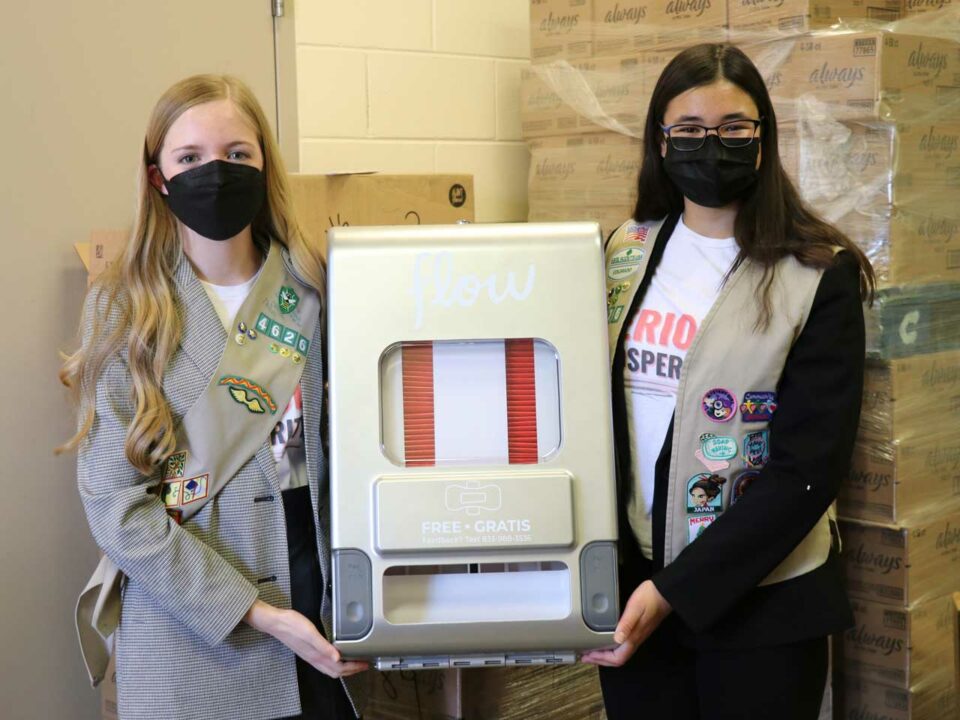One in four teens nationally has missed class due to lack of access to menstrual supplies, according to a report by the Alliance for Period Supplies. For some Colorado students, a lack of access to hygiene products and sufficient menstruation education poses even more challenges.
“People need to know that this is happening here,” says Geoff Davis, whose organization, Period Kits Denver, provides period supply kits to local groups and people experiencing homelessness. He’s received emails from schools; one telling of a student from Brighton in the health aid office because she’d been changing tampons every other day in order to ration them.
Davis started Period Kits Denver because a friend told him they’ve had to choose between food and tampons before. Neither food stamps nor the Special Supplemental Nutrition Program for Women, Infants, and Children cover tampons or pads.
“This is about dignity,” says Davis. He believes that if a school is buying toilet paper, it should be buying pads, “because both are bodily functions you have no control over.”
Access and Safety in Schools
The new Free Menstrual Hygiene Products to Students bill was signed by Governor Polis in July 2021. Beginning with the 2021-2022 fiscal year, the bill appropriates $100,000 to the department of education for grants. School districts and charter schools with 50 percent or more students on free or reduced lunch can apply for the grants in order to provide tampons or pads in their restrooms at no cost to students.
To Davis, the grant program is positive, but doesn’t solve the whole problem. Costs for a district to purchase dispensers and stock them can be high. For reference, Boulder Valley School District, which has 34 middle and high schools, recently spent $9,000 to purchase 240 dispensers and anticipates a $20,000 bill to keep as many restrooms stocked each year.
Lauren Campbell and Annaliese Austin, now sophomores at Grandview High School, recently earned the Girl Scouts Silver Award for bringing period products to every girls’ restroom at Liberty Middle School in Aurora. They crowdfunded $1,200 to purchase six dispensers and got the support of Always brand feminine products which donated more than 75,000 pads.
“A lot of people who are impoverished don’t have the money to buy period products, which is just not fair,” says Campbell, who learned of the term “period poverty” in middle school. Campbell is now working with legislators on eliminating sales tax for period products across Colorado; Austin’s plan is to get the whole Cherry Creek Schools district to supply middle and high schools with sanitary products.
These efforts would not be complete, however, without understanding of the trans-male and nonbinary experience, according to Anat “Nati” Geva, Ph.D., a licensed clinical psychologist who works as a school-based counselor. “[Periods] being identified so strongly with a female body is very hard for them, so getting their periods is an especially anxiety-provoking time in the month,” says Geva.
Schools making period products accessible in bathrooms (not just in the nurse’s office) would make school more welcoming to all students… “knowing that there’s an easy quick fix, you don’t have to ask anyone for it and don’t have to explain anything,” says Geva.
A Parent’s Role in Period Preparedness
Both Campbell and Austin felt their health classes didn’t adequately equip them to deal with menstruation. “When I was on my first period, I didn’t tell my mom, or anyone else,” says Austin. “I just stuffed toilet paper in my underwear. So that wasn’t great.” She also notes that stigma gets perpetuated when boys are left out of the conversation.
“A lot of adolescents grow up with the sense that having a period is not something you talk about, it’s shameful, it’s dirty,” says Geva. “It’s a legitimate conversation, and it’s something maybe that we should teach both male and female teachers how to approach in a way that takes away the shame and stigma and gives the [student] options.”
Help educate and prepare your kids at home with these resources:
- Read the American College of Obstetricians and Gynecologists guide to premenstrual syndrome.
- Check out “How To Support Trans People During Their Periods” by Clue, an inclusive tracking and education app.
- Order LOLA’s first period kit, which includes organic cotton tampons and BPA-free products, tracking stickers, and a digital guide with basic cycle information, plus answers to those “Is this normal?” questions.
- Host a period product drive using the Period Supply Drive Toolkit from The Alliance for Period Supplies.
Start the Conversation Early
Emily Jorgensen, Windsor mother of three and founder of Grace Upon Grace, a nonprofit organization that provides period products to underserved families, takes steps to normalize menstruation with all the members of her house—her children are age four and under. “I think if we can really get that whole body health understanding with a period, it would be really freeing for some individuals,” says Jorgensen.
For example, when someone at 15 is menstruating and they say they don’t feel well, a parent might go beyond saying, “It’s just PMS,” and instead ask questions about the different pains, aches, and emotions they’re experiencing.
Heather Williams, also of Grace Upon Grace, led her daughters through a celebration when they got their first periods, complete with clothes shopping, dinner, and a short blessing. “My goal with everything,” says Williams, “is for my daughters to trust themselves, pay attention to their bodies, be in tune with their intuition, and to respect and honor their bodies so that they expect others to do the same.”
Denver City Council voted to remove the sales tax from menstruation products locally in 2019, and Aurora followed suit in March 2021. Yet Colorado is one of 29 states where menstruation products are not tax free; they’re considered “luxury items.” Campbell’s Girl Scout Gold Award project is to work with legislators on eliminating the tax. Austin’s Gold Award plan is to get the whole Cherry Creek School district to supply middle and high schools with sanitary products.





